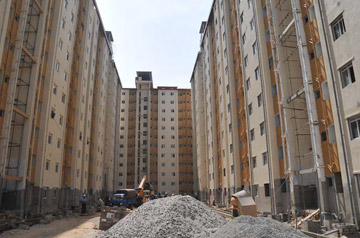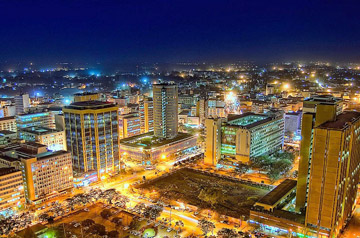Real estate investment on the gallop
by S. N. Wijepala
The property market can be considered as an important sub-sector of
the overall investment market. Unique attraction of property as a
vehicle for investments is its inherent capacity to overcome the adverse
effect of inflation.
|

Apartments being built in Colombo. |
In a scenario where there is relatively high rate of inflation and at
the same time capital gains tax is absent, the importance of property as
a hedge against inflation naturally assumes a greater role in the
investment market.
It is a little known fact that the value of daily property
transactions in the country generally surpasses the turnover at the
stock exchange. Only the input of property construction is vaguely
recorded at about 8% of the GDP.
If the full value of the operations in the property market is taken
into account, it can exceed even 12% of the GDP. Yet it appears that
this important role that the property investors and developers play in
the overall economy is not fully appreciated.
The property development forms a vital component of the property
investment market.
Looking at the history of property development in Sri Lanka, one sees
the emergence of Level One Development in the fifties and sixties where
large tracts of rubber and coconut land were sub-divided into
residential blocks and sold to individual house builders. Many of these
developments have now evolved into nice residential neighbourhoods in
and around major urban areas in the country.
At the same time, residential apartments which were at the time known
as 'flats' emerged such as Bambalapitiya Flats and Grandpass Flats
development by the Government and Bogala Flats by the private sector.
Development
Level Two of property development which emerged in the late sixties
and early seventies saw more value addition to vacant and agricultural
land where the development was well-planned with wide internal road
network and the supply of water and electricity.
|

Multi-storeyed residential property development sector also
transformed itself from early ‘flats’ into new highrise
apartment blocks |
Fine examples of this type of development can be seen in Ambagahapura
in Maharagama and Subhuthipura in Battaramulla.
With the advent of the open economy in late seventies, property
development saw a new phase with high rise buildings changing the
skyline of Colombo dramatically.
At the same time property development advanced to its Level Three in
the form of large scale integrated development such as Millennium City
in Athurugiriya.
Multi-storeyed residential property development sector also
transformed itself from early 'flats' into new highrise apartment
blocks.
Commercial development also rose to new levels in development such as
Liberty Plaza, Majestic City, Bank of Ceylon head office, the World
Trade Centre and hotels like Hilton and the Galadari.
Hence, it can be said that, with the exception of few failures like
HPT and Lee Potter, property development in Sri Lanka has progressed
steadily throughout.
Leap forward
With the dust now settled (except in Geneva perhaps) on terrorism
with its cessation in 2009 and the resulting lifting of adverse travel
advisories issued by many countries, the property development is set to
leap forward into new dimensions.
This trend has been augmented by the emergence of the West from the
economic crisis originated in the US in 2008 and the new radical steps
taken by the Government in releasing under-utilised and unutilised State
land in urban areas for private property developers under strategic
planning by the UDA.
In the circumstances a huge spree of property development can be
expected in the near future in Sri Lanka.
However, we at the Institute of Valuers see that there are still
several potentials for property development and investment which have
not been tapped properly yet.
One is the concept of Time Sharing which is now well established in
coastal belts in Spain, Portugal, Greece and Brazil.
This type of development greatly helps the tourist industry as well.
The other is the concept of Real Estate Investment Trusts (REIT) which
is also well established in countries like UK, Hong Kong and Australia.
Hence we have decided to organise a two-day international seminar on
April 25 and 26 at the BMICH to look at these two potentials in property
investments and to see to what extent Sri Lanka can adopt these concepts
to enhance the quality of property development environment.
These issues will be addressed by overseas experts. In order to
complete the picture for the potential investors, Planning Regulations
and Condominium Law in Sri Lanka will also be discussed.
Deputy Minister of Finance and Planning, Dr. Sarath Amunugama, the
chief guest will inaugurate the sessions.
The seminar will benefit not only the property developers and
investors by stimulating their analytical thinking and enhancing the
quality and accuracy of their policy decisions but also the banking
sector on which the property investors rely heavily for the necessary
funding.
The writer is the President of the Institute of Valuers of Sri Lanka. |

